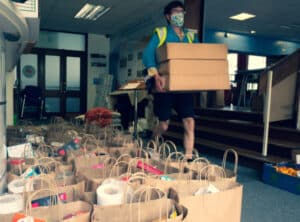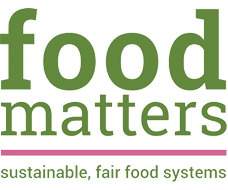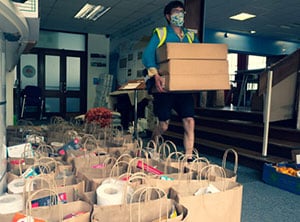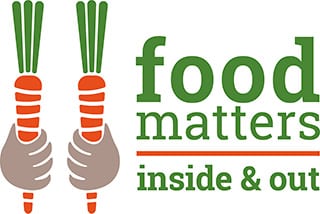Blog by Sarah Davies, August 2021
In July 2021 Food Matters was invited to the celebratory closing of the COVID emergency food distribution centre in Brighton. A celebration of the huge effort across multiple partners and volunteers that together managed to feed up to 3063 households per week struggling to provide a healthy meal.
This was a massive achievement repeated in many cities, towns and villages across the country. Almost overnight, restaurants became meal distribution centres, community buildings were commandeered to house surplus food from broken supply chains; head teachers took it upon their own shoulders to distribute free school meals to homes of their pupils; and in many places the local authorities worked flat out to convene voluntary sector partners and businesses to coordinate the response. Stakeholders were united by a single clear common purpose, and It’s amazing what was achieved as a result.
What next for emergency food?
As the initial emergency morphed into a sustained, more organised response, the emergency food groups set up in many communities started to turn their attention towards the future. Questions started to emerge about what next. How can we better support the multiple needs of people accessing our food service? How can we step away from providing emergency food? How can we take a longer-term view to addressing food insecurity?
Food Roots Incubator programme
In London, Food Matters is currently working with Sustain on the Food Roots Incubator programme. A piece of work commissioned by the Greater London Authority working with 10 Boroughs to support the transition from the emergency response and a focus on food insecurity towards a wider sustainable food systems agenda. From experience, we know the journey is not necessarily an easy one. To step back and see the emergency response in relation to the wider food insecurity agenda is one thing and an area where many partnerships are now building connections – addressing the root causes of poverty, using cash first approaches etc. But to take a wider whole food systems view requires another shift.
In July, Food Matters ran a lively workshop with London partnerships discussing this journey. How do we move on? How do we build on the engagement of new stakeholders? How do we bridge the gap between the queue of hungry people wanting a food parcel and the longer-term solutions to food security and the wider whole food system approach?
Local food system resilience
One thing that became apparent in the pandemic has been the enhanced capacity to respond by those places that already had a sustainable food partnership. The existence of a partnership meant that the web of food system connections was already strong; there was a resilience; people knew who to call, who could be called upon for transporting food parcels; how the food system worked.
At the heart of sustainable food partnerships is the coming together around a collaborative vision for the transformation of the food system towards a more sustainable future. Taking a longer-term view about the impact of food on our health, our environment and our local economies. Our work in London will focus on putting in place a strategy and a plan of action that seeks to tackle these integrated issues and build a food system that is resilient to future shocks.
Maybe then, it is no surprise that the Brighton COVID emergency food distribution centre is one of the first to close….. the city was also the first place in the UK to achieve the Sustainable Food Places Gold Award. After all, how can we have long term food security without a sustainable food system?
In July 2021 Food Matters was invited to the celebratory closing of the COVID emergency food distribution centre in Brighton. A celebration of the huge effort across multiple partners and volunteers that together managed to feed up to 3063 households per week struggling to provide a healthy meal.
This was a massive achievement repeated in many cities, towns and villages across the country. Almost overnight, restaurants became meal distribution centres, community buildings were commandeered to house surplus food from broken supply chains; head teachers took it upon their own shoulders to distribute free school meals to homes of their pupils; and in many places the local authorities worked flat out to convene voluntary sector partners and businesses to coordinate the response. Stakeholders were united by a single clear common purpose, and It’s amazing what was achieved as a result.
What next for emergency food?
As the initial emergency morphed into a sustained, more organised response, the emergency food groups set up in many communities started to turn their attention towards the future. Questions started to emerge about what next. How can we better support the multiple needs of people accessing our food service? How can we step away from providing emergency food? How can we take a longer-term view to addressing food insecurity?

Food Roots Incubator programme
In London, Food Matters is currently working with Sustain on the Food Roots Incubator programme. A piece of work commissioned by the Greater London Authority working with 10 Boroughs to support the transition from the emergency response and a focus on food insecurity towards a wider sustainable food systems agenda. From experience, we know the journey is not necessarily an easy one. To step back and see the emergency response in relation to the wider food insecurity agenda is one thing and an area where many partnerships are now building connections – addressing the root causes of poverty, using cash first approaches etc. But to take a wider whole food systems view requires another shift.
In July, Food Matters ran a lively workshop with London partnerships discussing this journey. How do we move on? How do we build on the engagement of new stakeholders? How do we bridge the gap between the queue of hungry people wanting a food parcel and the longer-term solutions to food security and the wider whole food system approach?
Local food system resilience
One thing that became apparent in the pandemic has been the enhanced capacity to respond by those places that already had a sustainable food partnership. The existence of a partnership meant that the web of food system connections was already strong; there was a resilience; people knew who to call, who could be called upon for transporting food parcels; how the food system worked.
At the heart of sustainable food partnerships is the coming together around a collaborative vision for the transformation of the food system towards a more sustainable future. Taking a longer-term view about the impact of food on our health, our environment and our local economies. Our work in London will focus on putting in place a strategy and a plan of action that seeks to tackle these integrated issues and build a food system that is resilient to future shocks.
Maybe then, it is no surprise that the Brighton COVID emergency food distribution centre is one of the first to close….. the city was also the first place in the UK to achieve the Sustainable Food Places Gold Award. After all, how can we have long term food security without a sustainable food system?






